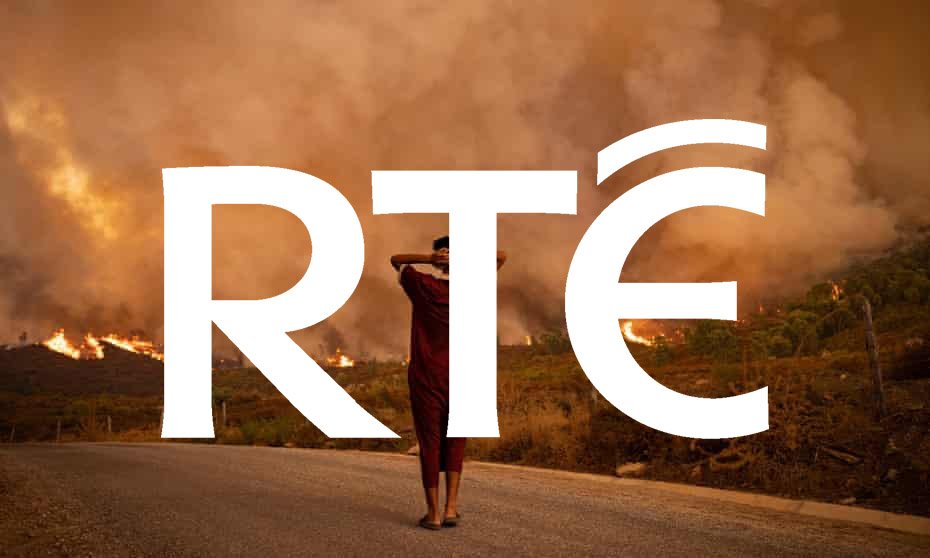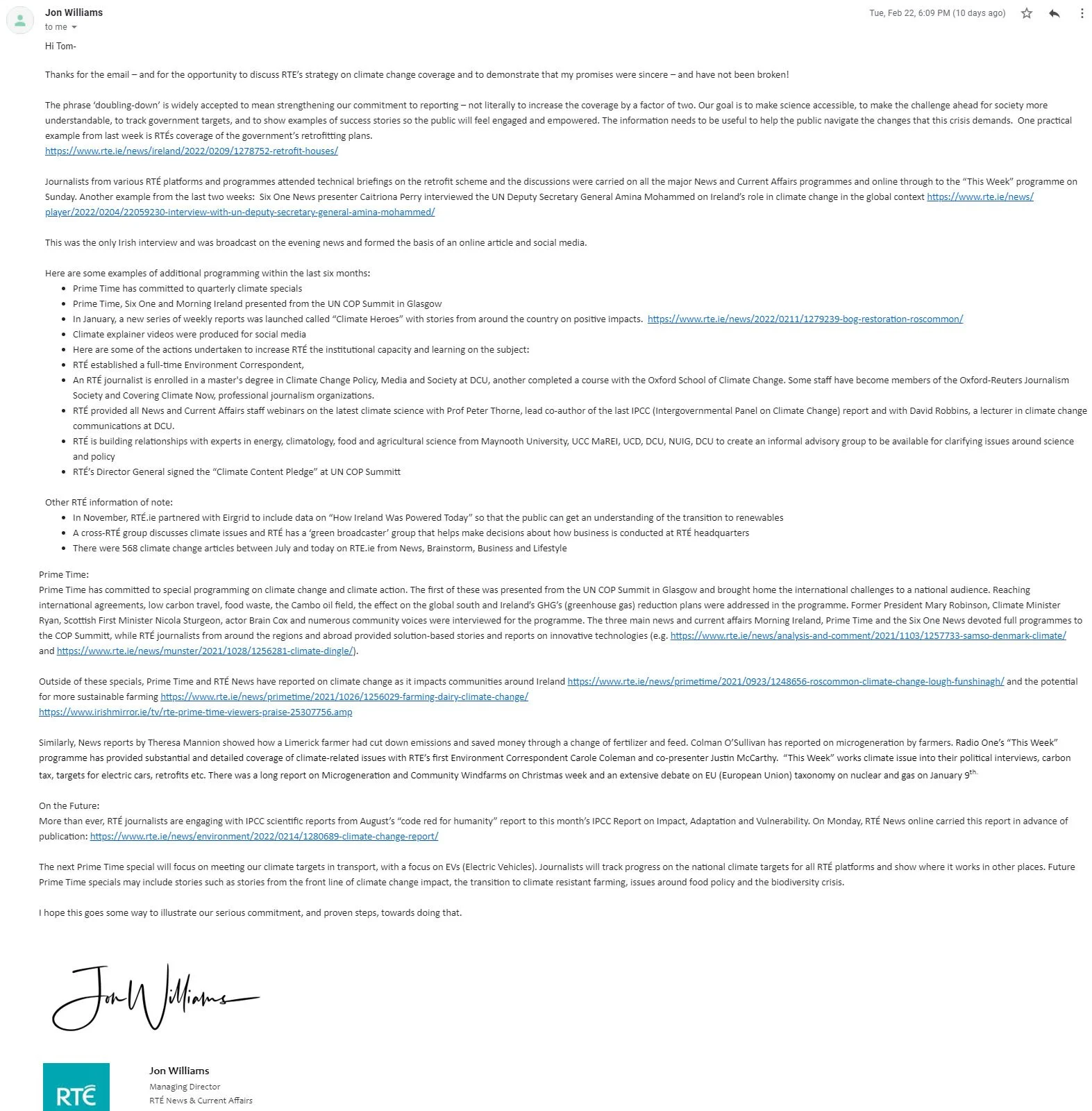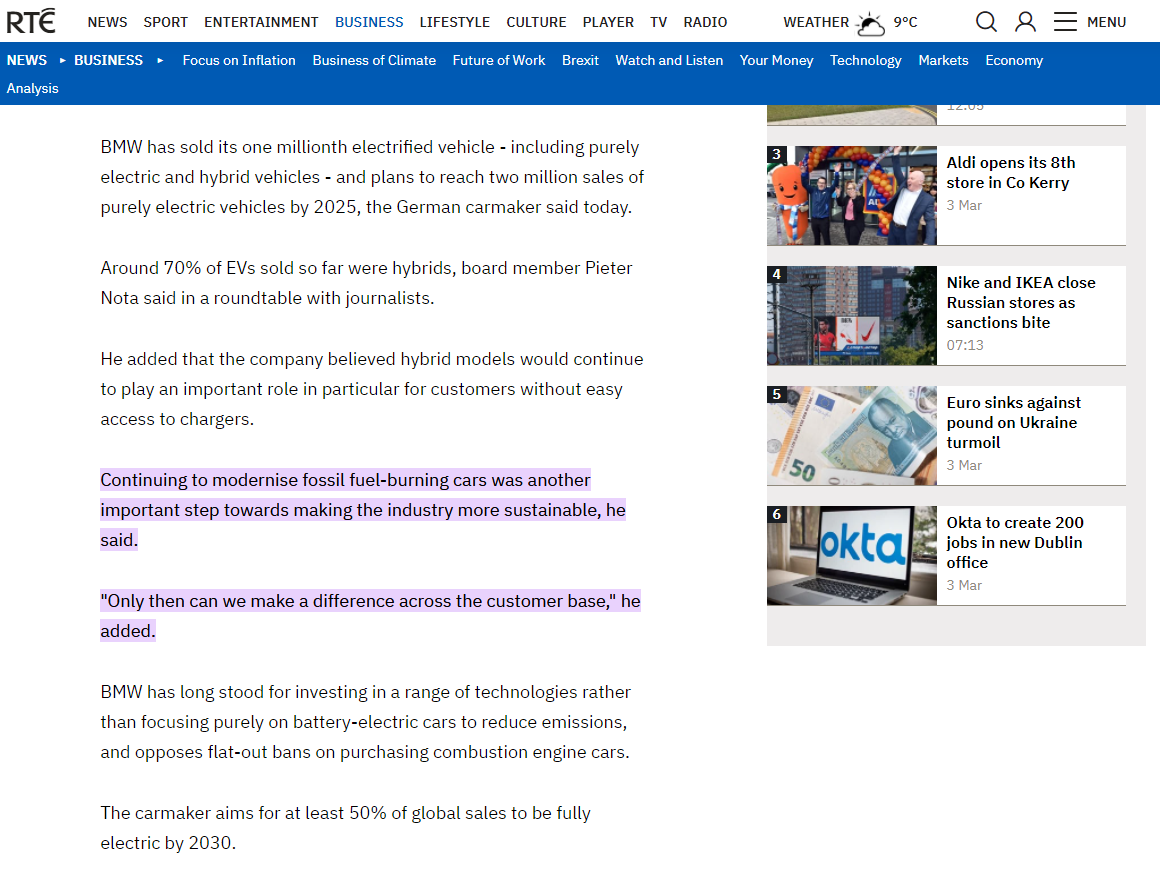
RTÉ and the Climate Crisis
In July 2021, the Managing Director of RTÉ News & Current Affairs – Jon Williams – issued a public apology regarding the national broadcaster’s poor coverage of the Climate Crisis.
The apology came in the wake of public outcry as RTÉ consistently overlooked the role of the Climate Crisis in worsening and increasing the frequency of extreme weather events. Mr Williams vowed to do better.
With 8 months having passed since his apology, we investigate to understand whether this has led to tangible change within the news organisation and its output, or whether the words were merely an empty promise.
The Apology
Mr Williams issued the public apology following repeated criticism of RTÉ’s lack of Climate Crisis coverage, which culminated during a heatwave where temperatures in Ireland reached 30°C – with extreme weather events, and related deaths, becoming considerably more likely as the Climate Crisis worsens.
In response, Mr Williams posted the following on Twitter:
“We were wrong not to make clear connection between recent extreme weather events & climate change. Sin of omission & reported in good faith. But truth matters. So when we get it wrong, we should say so. Lesson learned. Work to do.”
The post was accompanied by an article from Mr Williams entitled ‘How RTÉ is covering climate change’, which signed off with the following lines:
“Pre-pandemic RTÉ’s financial challenges meant one correspondent covered both science and environment. Since March 2020, our science correspondent has been exclusively assigned to covering the Covid crisis. However, as Ireland emerges from the pandemic, we will double down on our coverage of climate issues.”
Jon Williams’ acknowledgement that RTÉ was failing to cover the Climate Crisis sufficiently, and promise to do more to address this shortfall. Credit: Jon Williams/Twitter
What Has Changed?
So what has changed in the interim 8 months since this public acknowledgement that RTÉ was failing to report accurately and consistently on the Climate Crisis?
We contacted Mr Williams in January to gain a better understanding of how the news organisation has responded, and received a full response from him last week – see the image below left (you may need to Zoom to read).
There certainly are some welcome changes, such as the establishment of a full-time Environment Correspondent, webinars for staff and building relationships with academic experts around Ireland.
Email from Jon Williams to IrishEVs in full
However, great concerns remain.
It is not clear whether these webinars were mandatory for staff or merely an option, and recent coverage in the Business section demonstrates that these have had little effect – with multiple articles on Ryanair’s expanded flight schedules failing to even mention to the relationship between aviation and the Climate Crisis.
Or, perhaps a more stark example is the baffling celebration of John Travolta flying his private jet to Shannon Airport, which somehow warranted its own article and failed to mention that the CO2 emissions per person on a private jet are around 8 times higher than people flying in a Boeing 737.
Furthermore, while Mr Williams asserts that 568 articles on the climate were published in the past year, the value of these articles is often highly questionable.
For example, stories such as ‘Catherine Fulvio's top tips for preventing food waste’ fail to have a single mention of the word ‘climate’ and frankly have very little to do with actually overcoming the Climate Crisis.
While food waste is a genuine issue, articles that focus on relatively minor Climate Crisis contributors and which overlook the impact of major carbon emitters are relatively worthless and empower major polluters to continue to get away with worsening both public and planetary health.
Then, of course, there is the issue of running syndicated news based on corporate press releases, which allows companies to pass off opinion as fact – something that RTÉ is enabling all too often. We have written about this issue extensively here.
Every single time the link between a major polluter and the Climate Crisis is overlooked – as with the consistent and extensive promotional coverage of Ryanair’s expanded services – RTÉ is missing a golden opportunity to educate and inform its readers about the severity, extent and implications of the Climate Crisis.
As a public broadcaster this is incredibly concerning.
And, frankly, any increase in programming about the climate is being undermined by allowing stories about major polluters to consistently go unchecked and without any educational or informative reference to readers about how these announcements impact the Climate Crisis.
The Climate Content Pledge that RTÉ has signed up to specifically sets out that “the decisions that governments, businesses and individuals make now and over the next five years are crucial to setting a sustainable climate trajectory.”
With less than 7 years to avert the worst possible outcomes of the Climate Crisis, we do not have time to waste, and hiding behind “financial challenges” while still having numerous journalists covering Sport and Entertainment just shows how deprioritised the Climate Crisis has been at RTÉ.
Even the language being used by RTÉ marks them out against those publications who are leading journalistic efforts to report accurately on the Climate Crisis. This piece from The Guardian in May 2019 about the importance of using terms such as ‘Climate Crisis’ really shows how far RTÉ has to go.
Where Is The Transparency?
While Mr Williams is happy to debate the semantics of the phrase “double down on our coverage of climate issues” – one interpretation of which is absolutely the doubling of the number of articles – he refused to address our questions about how RTÉ is tracking its progress on covering the Climate Crisis.
RTÉ News stories - especially those in the Business section - consistently fail to mention vital connections to the Climate Crisis, despite staff being given webinars. Credit: RTÉ
The changes outlined in his email don’t mean anything unless new measures are put in place to ensure that best practice is being adhered to, and the change in both the quality and quantity of Climate Crisis coverage is being tracked.
Such metrics are crucial to understand the progress that has been made and in reporting how far you have to go.
You and I will do this in terms of setting a target when losing weight, or measuring the gains we make in trying to run a certain distance in a faster time.
What’s more, this is crucial in proving to yourself – and others – that you haven’t just made improvements, but that the underlying methodology actually works.
This is sorely lacking in RTÉ’s and Mr Williams’ response to Climate Crisis coverage.
The replication of press releases and opinion over fact through syndicated media is incredibly alarming, and empowers corporations to avoid necessary media scrutiny about their true ‘green’ credentials. Credit: RTÉ
Lessons Not Learned, Work To Do
As welcome as some of the individual acts outlined in Mr Williams’ email may be, without context they are frankly meaningless.
Our intention of contacting Mr Williams regarding his previous apology about RTÉ News’ failure to cover the Climate Crisis in a necessary manner was to understand what progress has been made, what progress will be made, and how this will be ensured.
His response offered little context in what has meaningfully changed from before.
Were these changes planned before his apology? Why were they enacted over other avenues of progress? Why did it take so long for these changes to be implemented? And how will their impact be transparently tracked and reported?
the changes he outlined:
What measures are being put in place to ensure that best practice is being adhered to across the newsroom? (Particularly in light of consistent overlooking of climate and emissions in business stories)
Could you elaborate on where you believe that RTÉ News is “lead[ing] the conversation about the climate crisis, and the impact it is having.” And what does leading the conversation mean to you in real terms?
How can RTE justify the publication of articles on the ‘climate’ page (e.g. “Catherine Fulvio’s top tips for preventing food waste”) which do not have a single mention of ‘climate,’ and do not provide any meaningful education about the Climate Crisis?
How will you measure the success of your pledge to double-down on the Climate Crisis content?
Will you be reporting publicly on where RTÉ News has met expectations, and where it can improve?
“I set out – at some length – how RTÉ News was addressing the issue. I don’t intend to elaborate further”
When asked to provide this essential detail, his response was short and blunt: “I set out – at some length – how RTÉ News was addressing the issue. I don’t intend to elaborate further”.
Remember that these are the words of the Managing Director of a news organisation that is part funded by public money. Then make your judgement on whether this is a satisfactory response.
For our part, we’re always concerned when a news organisation is not willing to address questions about transparency in good faith, especially given understandable public criticism – and a promise to do better – in the recent past. It would appear from our email exchange that Mr Williams was more concerned about the amount of time put into writing a lengthy email than addressing our actual concerns.
However, it has to be said that Mr Williams has at least done more than most and at least acknowledged the failings of RTÉ, while promising to do better. When we see rampant climate denial and greenwashing across the Irish press, this stands out at least as an honest attempt to do something to drag the Irish media into dealing with this ubiquitous issue – even if a tangible impact is still impossible to measure.
To return to Mr William’s Twitter apology, we would say: when they get it wrong, they should say so. Lessons have not yet been learned. Work to do.
What To Read Next
Ecocide: Making Environmental Destruction A Crime
New legal definitions could have major implications for holding corporations and governments criminally accountable for offences against the environment
Media Accountability: Cars & Climate Change
It’s time for the media to step up and start reporting on the dire health & environmental impact of cars as a leading contributor to climate change. Overlooking these consequences perpetuates climate denial







